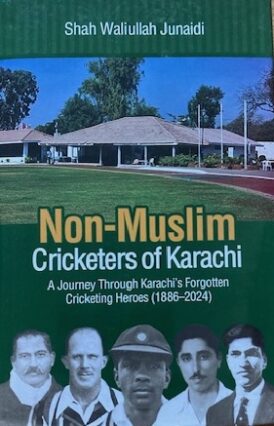Non-Muslim Cricketers of Karachi
Martin Chandler |Published: 2025
Pages: 96
Author: Junaidi, Shah Waliullah
Publisher: Shah Muhammad Hamza
Rating: 3.5 stars

When I was at school in the 1970s I learnt something of the history of the world. Then after I left school, and developed an interest in the immediate post was years, I read a good deal about the partition of India and the roots of the modern nations of India and Pakistan. I found it fascinating.
The trouble was however that it never occurred to me to question what I read in books, and saw on television documentaries, so much so it has only been in the last decade that I have realised that everything I had read and seen was at best misleading, and at worst a complete distortion of what actually happened.
I was brought up to believe that whilst politicians might disagree with each other that they would never lie. It wasn’t therefore much of a stretch to extend that reverence to historians. The advance of Anno Domini has brought with it the realisation that some members of those two professions, and indeed many others, have no difficulty at all in being economical with the truth.
Which is a rather long winded way of saying that, although this certainly wasn’t Shah Junaidi’s aim in writing this book, I learnt a good deal about non-cricketing matters. What was most illuminating was to learn that there was a time when the population of Karachi was 50% Hindu. It must follow from that, taking into account the other groups profiled by Junaidi, Parsis, Christians, Jews, Sikhs and Ahmadis, that at some point less than half of the city’s population were Muslim.
But the book is about cricket so, after some brief background paragraphs the main purpose of it is to profile the leading cricketers from each of the non-Muslim groupings. Just four are Pakistan Test cricketers, Hindus Anil Dalpat and Danish Kaneria, and Christians Wallis Matthias and Antao D’Souza. There are numerous family connections throughout the book, but just using those Test players as examples there were also two more D’Souza brothers, and Kaneria and Dalpat are cousins.
Going back, as it does, to the dawn of First Class cricket in Karachi there are few names in the book outside the Test cricketers* that are familiar, and tracking down even the basic biographical details cannot have always been easy, let alone the many photographs that Junaidi has been able to locate. What he does find is certainly worth reading and the book is full of interest.
At the close of Non-Muslim Cricketers of Karachi there is an epilogue, just a single paragraph, but it is a hugely meaningful one. Junaidi makes the observation that his book stands as a powerful reminder of a time when sport transcended faith and politics. Wise words indeed, and he goes on to express the hope that his words will inspire future generations to embrace the values of inclusion and respect for all communities. Amen to that.
*Karachi born men who played Test cricket for India who feature in the book are JK Irani, Naoomal Jeoomal, and Gulabrai Ramchand






Please note the book is available here in the UK from myself. Please E=mail cricket@talbot.force9.co.uk for more details. David.
Comment by David Battersby | 5:12pm BST 27 July 2025
“This book is a hidden gem for cricket lovers — filled with knowledge and information our cricket legends in Karachi that very few people know about. Reading Shah sb’s books offers a lot to learn and significantly increases one’s knowledge.”
Comment by Zia | 2:15pm BST 10 August 2025